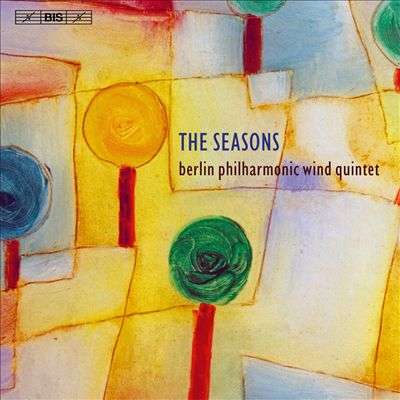|
Back
07/24/2013
Jacques Ibert: Trois pièces brèves
Henri Tomasi: Printemps
Darius Milhaud: La Cheminée du roi René, Op. 205
Charles Koechlin: Septet for Winds, Op. 165
Jean Françaix: Quintet No. 1
Eugène Bozza: Scherzo
Samuel Barber: Summer Music, Op. 31
Elliott Carter: Wind Quintet
Gunther Schuller: Suite
Kazimierz Machala: American Folk Suite
Júlio Medaglia: Suite Belle epoque en Sud-American – Suite Popular Brasileira
Heitor Villa-Lobos: Quintette en forme de Chôros
Liduino Pitombeira: Ajubete jepê amô mbaê
Paul Hindemith: Kleine Kammermusik, Op. 24 No. 2 – Septet for Winds
Hans Werner Henze: Quintet – L'autunno
Brett Dean: Winter Songs
Erkki-Sven Tüür: Architectonics I
Pēteris Vasks: Music for a Deceased Friend
Arvo Pärt: Quintettino, Op. 13
Carl Nielsen: Wind Quintet, Op. 43
Berlin Philharmonic Wind Quintet, Manfred Preis (alto saxophone), Gerhard Stempnik, Nigel Shore (cor anglais), Thomas Clamor (trumpet), Daniel Norman (tenor), Hermann Bäumer (conductor)
Recorded in Berlin: Andreaskirche (January 1991), Traumton Studio (1998), Studio Fritsch und Friends (September 1995), Siemens Villa (2002) & Philharmonie (April 2002) – 268'43
BIS-2072 – Booklet in English, German and French

   
This handsome quartet of Berlin Philharmonic Wind Quintet albums (also available separately, at twice the price) is an excellent, economic catalog of many of the important works for woodwind quintet in the 20th century. The standards (Barber, Nielsen and Hindemith chief among them) are given outstanding performances, and are flanked by some uncommon and esoteric works, all receiving star treatment. While a collection like this is bound to have some hits and misses, there are exciting major discoveries and enjoyable minor works sprinkled among the warhorses.
The "Seasons" theme prompts the titles of the individual discs, with "Spring" given over to fresh, peppy French works. Milhaud's La Cheminée du roi René, pungent and baroque-inspired, is the quirky heart, and throughout the disc, we find a bit more vibrato from the flute, a brighter oboe tone, and a less dominant horn sound, all fitting for French works. The simple, haunting melody of Ibert's second pièce breve is an earworm, while Henri Tomasi's Printemps is as close as one can come to a work in the genre by Messiaen, incorporating (perhaps more obviously than Messiaen would) bird-song motives in colorful juxtaposition with jazzy rhythms and harmony. The Koechlin and Françaix pieces are slight, but the Bozza Scherzo that closes the disc is a sheer delight.
"Summer" takes us to the Americas, with Barber's masterful Summer Music, played with rhythmic lilt and virtuosity in perfect balance, surrounded by the rhythmic energy of the Carter and Schuller works. The Schuller Suite is a true find, encapsulating the composer's virtuosity as a performer and interest in jazz. Elliott Carter writes that "On looking over some earlier quintet works, I found the composers were in the habit of overlooking the fact that each of these instruments has a different sound," but he surely must not have been listening to any of the works in this collection, though his contribution, from his Copland-esque 1940s period, is approachable, benefitting largely from its brevity. South America is well-represented, with Villa-Lobos' Quintette en forme de Chôros–plaintive cor anglais melodies juxtaposed with virtuosic wind flourishes–providing the meat and Júlio Medaglia's two suites providing colorfully-orchestrated and dazzlingly-played dessert.
Paul Hindemith's witty Kleine Kammermusik kicks off the "Autumn" disc, the finale played with stalwart gusto by the ensemble, now incorporating a denser, more homogenous sound. It is a thoroughly enjoyable piece, much more so than Hindemith's later Septet, where augmented forces are used solely to layer on more and more counterpoint. The final march is good fun, but the piece lacks the rhythmic finesse and melodic immediacy of the earlier suite. Hans Werner Henze's abstract set of variations that form his 10-minute Quintet has moments of lyricism that pique interest, but mostly sounds like anonymous 1950s modernism. Somewhat more attractive is L'autunno, which Henze insists is "programme music." The work is still quite abstract, its saving grace being a more delicate and varied use of timbre and texture throughout, as well as some dizzying flamboyant passages that are brought off with panache by these players.
The fourth disc, "Winter," begins with the eerie sonorities that open Brett Dean's Winter Songs–haunting settings of e.e. cummings–with tenor Daniel Norman joining the group and whispering and singing the poet's text above the quintet's textural backdrop. A former member of the Berlin Philharmonic, Dean displays a keen ear for sonority and, even more so, a sensitivity to cummings' poetry that makes the cycle a true find. There is a mixture of Britten-esque lyricism and more abstract, Darmstadt-style textual extraction that the composer blends into a convincing whole. The two single-movement works by Erkki-Sven Tüür and Pēteris Vasks are meditative in differing ways, the former chorale-based, the latter chant-like (with the instrumentalists singing along) with animalistic roulades peeking through and, occasionally, taking over. Many people will be surprised by Arvo Pärt's very early Quintettino, written a good while before the composer turned to "holy minimalism." Each brief movement of the triptych is exploratory and fixated on one idea, which is quickly worked out. The opening bassoon melody of Nielsen's Wind Quintet, played with exaggerated phrasing and dynamics, informs the style of the entire performance. Nielsen wrote the piece with the goal of emphasizing the the individual personalities of the dedicatee quintet, and the risky rubato and daring dynamics, verging on but never crossing into caricature, make the this rendition a delightful, distinctive reading and a fitting close to the collection.
Throughout, the recorded sound is close and clear. A more resonant acoustic might have helped some of the atmospheric and abstract works, but listeners interested in hearing every note (and every key click) clearly will be happy with the results. The pithy, informative program notes, partially written by the quintet's flutist, are handy references. This is an essential addition to the libraries of lovers of wind music, as well as those interested in exploring the variety of compositional voices the twentieth century offered us.
Marcus Karl Maroney
|